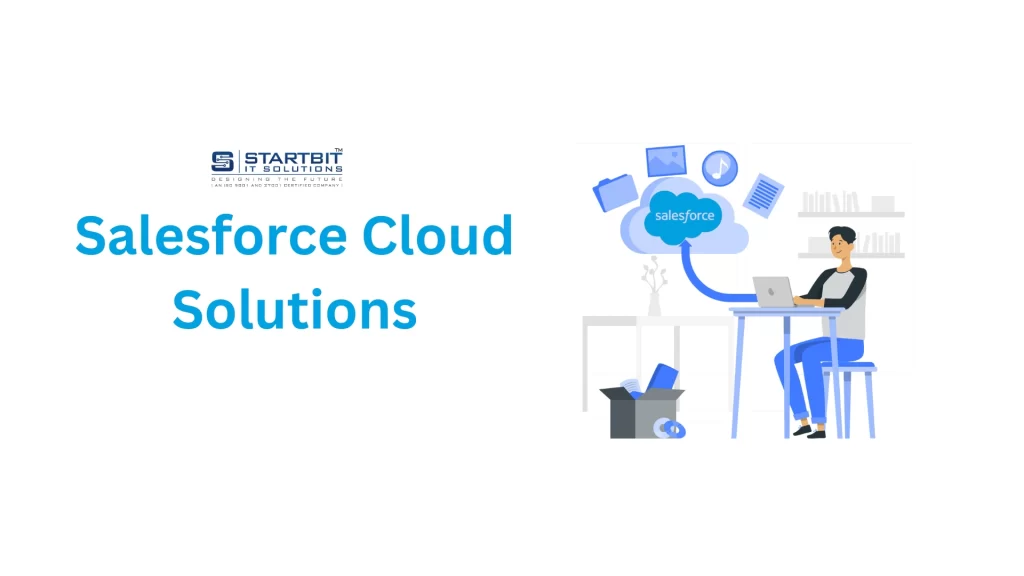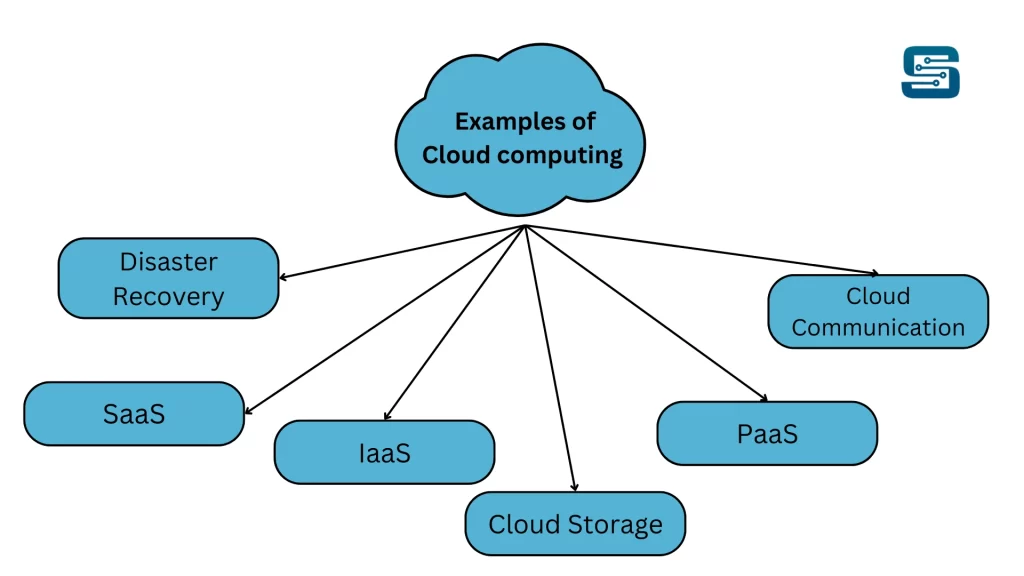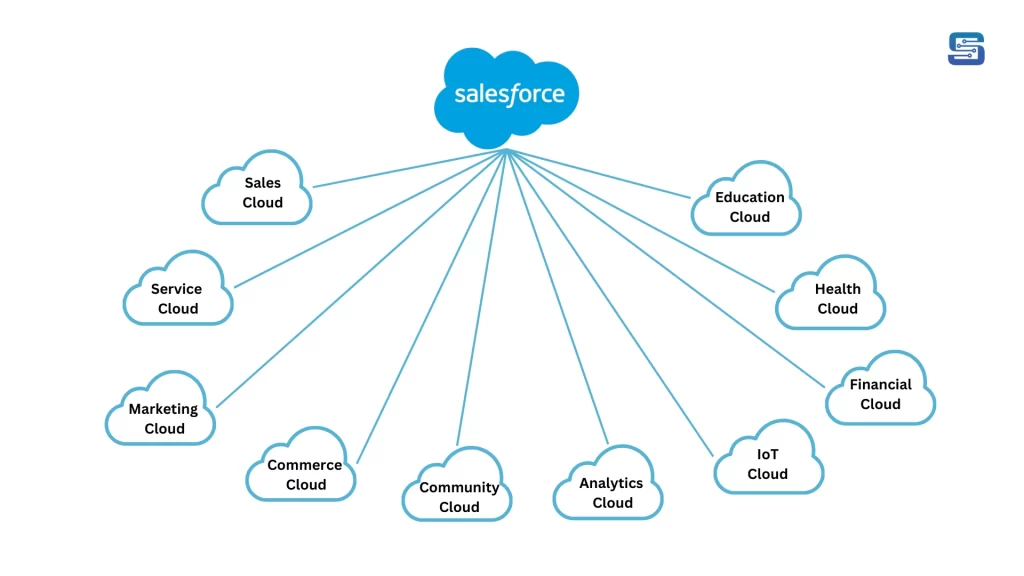
These days, businesses need strong mechanisms and solutions to be leveraged within their business operations and customer engagement in the face of the ever-changing digital world. This solution can arise with the solution the Salesforce Clouds make available, offering an all-rounded, streamlined cloud-based solution that fosters customer relationships and growth. Whether your business is small and a startup, or large and an enterprise, it makes you implement Salesforce Cloud Solutions in your business. With the force of Salesforce Cloud Services, you can expand your capabilities and take data-driven decisions to support success.
What is Cloud Computing?

Cloud computing refers to the model of delivering different services through the internet, such as storing one’s data, processing power, and using applications. One does not need to depend on local servers or even personal computers since lots of businesses use remote servers held by cloud service providers. Companies now can operate anywhere at any time with the help of only an internet connection. Knowing what is cloud computing would be fundamentally important for business houses, that would want to increase their operational efficiency.
One of the biggest advantages that cloud computing offers is its flexibility. Organizations are free to scale up or down their resources according to need, thus not committing themselves to physical infrastructure expenditure. Such scalability is highly beneficial for companies growing rapidly as well as those experiencing seasonally related growth and then decline. Cloud solution versatility means companies can immediately adapt their resources at any point in time so that they perfectly meet their customer’s requirements.
Cloud computing also enhances interdependence among teams through live access to data or applications from anywhere and by anyone. This allows for better sharing of ideas and work among team members. As companies increasingly opt for remote working, organizations using cloud services ensure they do not lose the efficiency and productivity of their employees.
Cost saving is another major advantage cloud computing presents to the organization. When an organization selects cloud services, it frees itself from having to pay for expensive hardware and infrastructural maintenance. The businesses can, therefore, adopt the pay-as-you-go model where they pay only for the resources consumed. This financial flexibility allows businesses to wisely use their budgets, invest in innovation, and enhance their bottom line to profitability.
Further, cloud computing enhances security and backup for data. Businesses usually take the blame for ensuring that their on-premises systems are secure. With a cloud services provider you trust, it will have invested so much in security measures already. Most cloud solutions possess automated backup capabilities to give a user peace of mind when using the solutions and minimize the possibility of losing data.
Examples of Cloud Computing:

To understand cloud computing, the common examples illustrating its application in different industries are brought forward to help people understand it.
SaaS:
Software as a Service means offering software applications via the Internet with no requirement for actual installations on the user’s computer. Examples of famous SAAS applications include Microsoft Office 365, Google Workspace, and Salesforce. These enable users to collaborate and share files seamlessly across any device with internet connectivity. Salesforce Cloud Services are an excellent example of SaaS and deliver business organizations powerful CRM tools from any place.
IaaS:
IaaS provides the facility to organizations by availing virtualized computing resources, such as servers, storage, and networks, from the cloud providers. Organizations can, therefore, manage their infrastructures without having physical hardware. For instance, AWS and Google Cloud Platform are some of the service providers that provide IaaS service. With IaaS, an organization can preserve control over its resources while retaining the flexibility of cloud solutions.
Platform as a Service (PaaS):
In PaaS, the service provides developers with a framework in which they build, deploy, and run applications without worrying about the underlying infrastructure. Under PaaS, development is simplified, and rapid application deployment becomes possible. The examples include Heroku and Microsoft Azure for PaaS providers. Therefore, this means using PaaS lets organizations focus on innovation and improving their products instead of worrying about the infrastructure.
Cloud Storage Services:
Tools like Dropbox, Google Drive, and Amazon S3 enable users to store files in the cloud and access them securely from anywhere by offering features such as teamwork and collaboration. As tools that do away with on-premise or physical storage devices, they are automatic regarding the backup of data and, therefore, ensure safety and accessibility. Organizations that would be using cloud storage services shall make their document management processes easy to conceive and work collaboratively.
Cloud Communication Software:
The main software used for remote team communication and collaboration includes Zoom, Slack, and Microsoft Teams. These have become the sine qua non for businesses looking to migrate into the system of remote work to ensure easy team interaction and coordination. The use of these cloud platforms helps in productivity and team unity across the whole geography.
Disaster Recovery Solutions:
Many companies are using the cloud computing platform due to an increase in reliance on this aspect for disaster recovery. Using data backup through the cloud, organizations are able to recover operations quickly in case of a data loss incident. Disaster recovery solutions based on the cloud ensure limited downtime as well as protect any critical business information. This supports the idea that cloud computing plays an important role in the continuity of businesses.
These examples show how the application of cloud computing could be very diverse by showing how these solutions can be capitalized on by any business to improve productivity, reduce costs, and make general efficiency in managing their activities. It is by understanding these examples that an organization will be able to identify the presence of Salesforce Cloud Solutions in their operations.
What is Cloud Computing with Example: Salesforce Cloud Services?

Salesforce Cloud Services include one of the services under cloud computing. This cloud service provider delivers a very wide spectrum of cloud solution that caters to diverse business needs for optimizing customers’ relationship management and enhancing the sales processes for the firm.
Sales Cloud:
It is more about sales operations and helps fortify the sales processes. It enables sales teams to acquire tools for lead management, tracking interactions with customers, and sales performance analysis. Businesses can better strategize their sales and improve revenue with features like lead scoring, opportunity tracking, customizable dashboards, and more. This will help the sales team make more data-driven decisions and optimize their performance through Salesforce Clouds.
Service Cloud:
Service Cloud is an entity that allows customer service teams to have the power to deliver great support through phone, email, chat, or even social media. Consolidating customer interaction into a synchronized view of customer history will help in the speedy resolution of problems and enhance a lot of customer satisfaction. This leads not only to increased customer loyalty but also overall improvement in customer experience and really emphasizes the value of Salesforce Cloud Solutions.
Marketing Cloud:
This cloud is a powerful platform to deliver business-to-consumer marketing with the development and management of personal marketing campaigns across channels. Powered by tools in email marketing, social engagement, and customer segmentation, organizations can easily target their desired audience for conversions. Using Salesforce Cloud Services can streamline marketing strategies with the right message at the right time for the appropriate customers.
Commerce Cloud:
Commerce Cloud is tailor-made for e-commerce companies, offering thorough management for online stores. From publishing product catalogs and inventory management to order fulfillment and processing payments, Commerce Cloud will ensure a smooth, seamless shopping experience for your customers. Salesforce cloud solutions can help the operation of an e-commerce company improve every aspect of their organization and increase customer satisfaction further.
Community Cloud:
This enables businesses to create online communities for their customers, partners, and employees. Collaboration and engagement foster communications, sharing of knowledge, and loyalty from various stakeholders, such as customers. Building a community with the Salesforce Clouds really adds strength to the relationship and belongingness established with a customer.
Analytics Cloud:
With Analytics Cloud, companies are driven to advanced data analytics, which enables informed decision-making from their data. With customizable reports and dashboards, organizations are able to track key performance indicators and determine trends with a goal of developing better performance. Using the power of Salesforce Cloud Services for business organizations unlocks the possibility for effective use of data for business growth.
IoT Cloud:
Salesforce IoT Cloud would be the connection of IoT devices through which businesses can manipulate the data this results into. This would allow organizations to analyze data directly in real-time, hence creating meaningful interactions of customer behavior. The companies could improve the experiences of their customers, enable them to optimize processes and streamline operations by integrating this IoT data into their operations.
Financial Services Cloud:
This is a solution that caters to the needs of financial institutions while paying attention to the managing of customer relationships and compliance as well as risk. It makes organizations more effective with their banking, wealth management, and insurance operations while providing unique, highly personalized services to customers in strict compliance with regulatory standards.
Health Cloud:
Health Cloud specifically caters to healthcare businesses regarding the management of their patient information and coordinated care along with engagement. The health cloud can improve patient outcomes and the health experience for patients by implementing the Specialized Salesforce Cloud Service.
Education Cloud:
This is the solution for educational institutions particularly, handling student data, engagement, and communication effectively for them. With Salesforce Clouds, schools and universities are positioned to do everything better in terms of student experiences, administrative process improvements, faculty and student collaboration, and much more.
Leverage cloud computing power with Salesforce Cloud Services to optimize your business operations, customer engagement, and growth.
Conclusion:
In short, using Salesforce Cloud Solutions can result in greater success when it comes to a business. With the increased use of cloud computing, therefore, organizations can streamline processes, thereby enhancing customer engagement as well as reducing the cost of operations. As organizations use the services of Salesforce, businesses can thus try to get ahead in their respective industries to cope better with the ever-changing digital landscape. Not only will Salesforce Clouds give your team the professional tools needed for the job, but it will also position your business for sustained growth and success in the future. Optimizing the sales process, improving marketing, customer service, or both can be made possible with Salesforce Cloud Services providing a comprehensive solution that meets the requirement and propels the business forward.
Contact Us: Get in touch with Startbit IT Solutions today for expert assistance in implementing Salesforce Cloud Solutions for your business.


